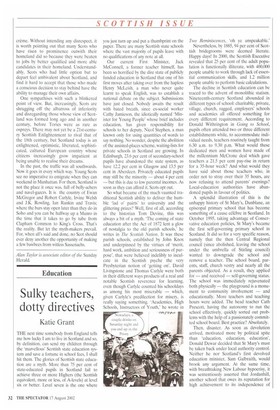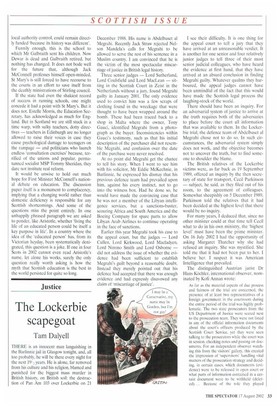Education
Sulky teachers, dotty directives
Katie Grant
THE next time somebody from England tells me how lucky I am to live in Scotland and so, by definition, can send my children through the 'marvellous' Scottish state education system and save a fortune in school fees, I shall hit them. The glories of Scottish state education are a myth. More than 75 per cent of state-educated pupils in Scotland fail to achieve three or more Highers (the Scottish equivalent, more or less, of A-levels) at level six or better. Level seven is the one where you just turn up and put a thumbprint on the paper. There are many Scottish state schools where the vast majority of pupils leave with no qualifications of any note at all.
Our current First Minister, Jack McConnell, a former teacher himself, has been so horrified by the dire state of publicly funded education in Scotland that one of his first moves after taking over from the hapless Henry McLeish, a man who never quite learnt to speak English, was to establish a national debate on the subject. Submissions have just closed. Nobody awaits the result with bated breath, since ex-social worker Cathy Jamieson, the idiotically named 'Minister for Young People' whose brief includes education, has given responsibility for schools to her deputy, Nicol Stephen, a man known only for using quantities of words to say nothing. No wonder, despite the abolition of the assisted-places scheme, waiting-lists for private schools in Scotland are growing. In Edinburgh, 23.6 per cent of secondary-school pupils have abandoned the state system, as have 12.2 per cent in Glasgow and 13.5 per cent in Aberdeen. Privately educated pupils may still be the minority — about 4 per cent — but this is due to low parental incomes. As soon as they can afford it, Scots opt out.
So what became of the much vaunted traditional Scottish ability to deliver the humble lad o' pairts' to university and the glittering prizes? Well, first of all, according to the historian Tom Devine, this was always a bit of a myth. 'The coming of state education after the Act of 1872 lent a glow of nostalgia to the old parish schools,' he writes in The Scottish Nation. It was these parish schools, established by John Knox and underpinned by the virtues of 'merit, hard work, ambition and seriousness of purpose', that were believed indelibly to inculcate in the Scottish psyche the very Presbyterian notion of 'getting on'. David Livingstone and Thomas Carlyle were both in their different ways products of a real and notable Scottish reverence for learning, even though Carlyle counted his schooldays as among his most miserable — which, given Carlyle's predilection for misery, is really saying something. 'Academies, High Schools, Instructors of Youth,' he wrote in co.et j•-np.o Two Reminiscences, 'oh ye unspeakable.'
Nevertheless, by 1885, 94 per cent of Scottish bridegrooms were deemed literate. Happy days! In 2000, the Scottish Executive revealed that 25 per cent of the adult population is functionally illiterate, with 400,000 people unable to work through lack of essential communication skills, and 1.2 million people unable to perform basic calculations.
The decline in Scottish education can be traced to the advent of monolithic statism. Nineteenth-century Scotland abounded in different types of school: charitable, private, village, church, ragged, employers' schools and academies all offered something for every different requirement. According to Donald Withrington in Going to School, pupils often attended two or three different establishments while, to accommodate individual needs, teachers routinely taught from 6.30 a.m. to 9.30 p.m. What would these dedicated men and women have made of the millennium McCrone deal which gave teachers a 21.5 per cent pay-rise in return for a 35-hour week? And what would they have said about those teachers who, in order not to stray over their 35 hours, are now refusing to attend parents' evenings? Local-education authorities have abandoned pupils in favour of politics.
A splendid illustration of this is the unhappy history of St Mary's, Dunblane, an episcopal primary school that has become something of a cause célèbre in Scotland. In October 1995, taking advantage of Conservative education policies, St Mary's became the first self-governing primary school in Scotland. It did so for a very specific reason, namely that the then Central Regional council (since abolished, leaving the school under the umbrella of Stirling council) wanted to downgrade the school and remove a teacher. The school board, parents, staff, church vestry and nearly all the parents objected. As a result, they applied for — and received — self-governing status. The school was immediately rejuvenated both physically — the playground is a monument to community involvement — and educationally. More teachers and teaching hours were added. The head teacher Cath Prescott, having the autonomy to run the school effectively, quickly sorted out problems with the help of a passionately committed school board. Best practice? Absolutely.
Then, disaster. As soon as devolution arrived, motivated more by political spite than 'education, education, education', Donald Dewar decided that St Mary's must be taken back under local authority control. Neither he nor Scotland's first devolved education minister, Sam Galbraith, would brook any argument. At the same time, with breathtaking New Labour hypocrisy, it was sententiously asserted that Jordanhill, another school that owes its reputation for high achievement to its independence of local authority control, could remain directly funded 'because its history was different'.
Funnily enough. this is the school to which Mr Galbraith sent his children. Now Dewar is dead and Galbraith retired, but nothing has changed. It does not bode well for the future that, although Jack McConnell professes himself open-minded, St Mary's is still forced to have recourse to the courts in an effort to save itself from the deathly ministrations of Stirling council.
If the state had even the shakiest record of success in running schools, one might concede it had a point with St Mary's. But it does not. Estelle Morris, the Education Secretary, has acknowledged as much for England. But in Scotland we are still stuck in a time warp, with sulky teachers, dotty directives — teachers in Edinburgh are no longer allowed to raise their voices in case they cause psychological damage to teenagers on the rampage — and politicians who launch endless 'consultation exercises' because, terrified of the unions and popular, permatanned socialist MSP Tommy Sheridan, they dare not institute real reform.
It would be unwise to hold out much hope for First Minister McConnell's national debate on education. The discussion paper itself is a monument to complacency, implying that a changing world rather than domestic deficiency is responsible for any Scottish shortcomings. And some of the questions miss the point entirely. In one unhappily phrased paragraph we are asked to ponder, like Aristotle, whether 'living the life of an educated person could be itself a key purpose in life'. In a country where the idea of the 'educated person' has, from its Victorian heyday, been systematically denigrated, this question is a joke. If one in four Scots in 2002 cannot even read Aristotle's name, let alone his works, surely the only question really worth asking is how the myth that Scottish education is the best in the world persisted for quite so long.































































 Previous page
Previous page